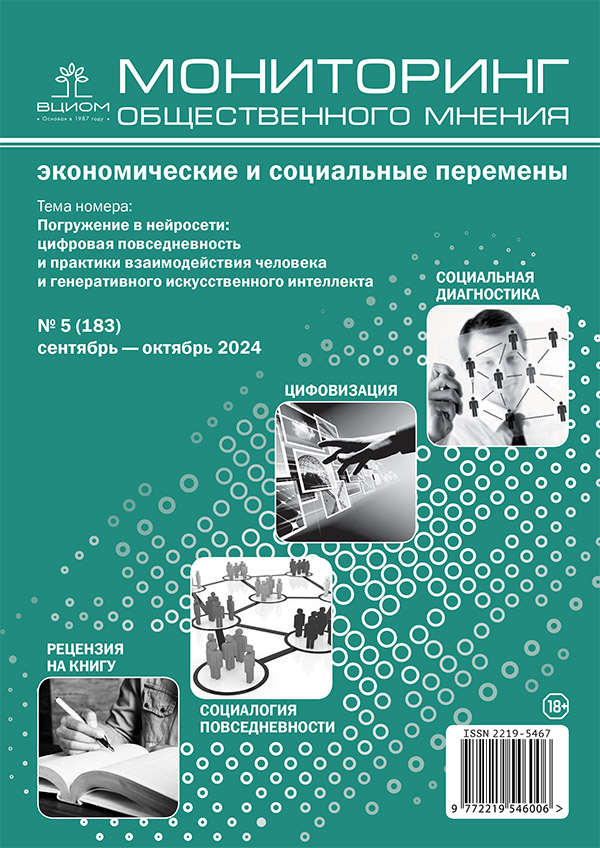Искусственный интеллект — это твое. Рец. на кн.: Ховард Дж., Гуггер С. Глубокое обучение с fastai и PyTorch: минимум формул, минимум кода, максимум эффективности. СПб.: Питер, 2022
DOI:
https://doi.org/10.14515/monitoring.2024.5.2550Ключевые слова:
искусственный интеллект, глубокое обучение, нейронные сети, обработка данных, моделирование, интерпретируемость моделей, этика искусственного интеллектаАннотация
Книга разработчика и бизнес-аналитика Джереми Ховарда и инженера-исследователя в области науки о данных Сильвейна Гуггера, вышедшая в 2020 г. и переведенная на русский язык в 2022 г., представляет собой попытку доказать читателю, что он, вне зависимости от образования и профессии, способен самостоятельно обращаться к одной из знаковых технологии XXI века — искусственному интеллекту (ИИ) и создавать продукты с его использованием. В работе проведен тщательный анализ тенденций ИИ, рассмотрен ряд технологий, необходимых для эффективной деятельности в данной сфере; описаны этапы разработки проекта с ИИ от постановки проблемы и сбора данных до создания графического интерфейса и размещения приложения на сервере; раскрыты наиболее острые проблемы, связанные со все более широким применением ИИ в компаниях; актуализирован тезис о необходимости «этического» подхода при работе с ИИ. Основная часть книги посвящена объяснению программ, реализующих тот или иной механизм ИИ (точнее, ту или иную архитектуру нейросетей), этапов и принципов написания кода, посредством которого решается одна из заранее заданных практических проблем. Однако для читателя, не желающего погружаться в программирование, работа предлагает материалы о теории ИИ, о методах получения максимальной полезности от ИИ в случае, если вы заказчик, а не исполнитель проекта, о правилах предупреждения негативных последствий включения ИИ в деятельность фирмы, следование которым требуется не только от разработчиков, но и от всей команды, работающей над продуктом, включая директорат. Таким образом, рецензируемая книга может быть полезна для представителей неограниченного круга профессий, должностей и интересов.
Библиографические ссылки
Ивлев Д. В. Искусственный интеллект и проблемы этики // Право и практика. 2023. № 4. С. 263—267.
Ivlev D. V. (2023) Artificial Intelligence and Ethical Issues. Law and Practice. No. 4. P. 263—267. (In Russ.)
Котов Д. А. Алгоритмы искусственного интеллекта в прикладных социологических исследованиях // СоциоДиггер. 2023. Т. 4. № 7-8. URL: https://sociodigger.ru/articles/articles-page/algoritmy-iskusstvennogo-intellekta-v-prikladnykh-sociologicheskikh-issledovanijakh (дата обращения: 12.10.2024).
Kotov D. A. (2023) Artificial Intelligence Algorithms in Applied Sociological Research. SocioDigger. Vol. 4. No. 7-8. URL: https://sociodigger.ru/articles/articles-page/algoritmy-iskusstvennogo-intellekta-v-prikladnykh-sociologicheskikh-issledovanijakh (accessed: 12.10.2024). (In Russ.)
Макаров К. С., Чертков С. Н., Лукьянчиков К. В. Концептуальная модель системы разметки графических данных для решения задач компьютерного зрения с использованием технологий машинного обучения // Auditorium. Электронный научный журнал Курского государственного университета. 2023. № 2. URL: https://api-mag.kursksu.ru/api/v1/get_pdf/4939/ (дата обращения: 20.06.2024).
Makarov K. S., Chertkov S. N., Lukyanchikov K. V. (2023) Conceptual Model of a Graphic Data Markup System for Solving Computer Vision Problems Using Machine Learning Technologies. Auditorium. Electronic Scientific Journal of Kursk State University. No. 2. URL: https://api-mag.kursksu.ru/api/v1/get_pdf/4939/ (accessed: 20.06.2024). (In Russ.)
Матвеева А. А., Махныткина О. В. Метод аугментации текстовых данных с сохранением стиля речи и лексики персоны // Научно-технический вестник информационных технологий, механики и оптики. 2023. Т. 23. № 4. С. 743—749. https://doi.org/10.17586/2226-1494-2023-23-4-743-749.
Matveeva A. A., Makhnytkina O. V. (2023) Text Augmentation Preserving Persona Speech Style and Vocabulary. Scientific and Technical Journal of Information Technologies, Mechanics and Optics. Vol. 23. No. 4. P. 743—749. https://doi.org/10.17586/2226-1494-2023-23-4-743-749. (In Russ.)
Намиот Д. Е., Ильюшин Е. А. Мониторинг сдвига данных в моделях машинного обучения // International Journal of Open Information Technologies. 2022. Т. 10. № 12. С. 84—93.
Namiot D. E., Ilyushin E. A. (2022) Data Shift Monitoring in Machine Learning Models. International Journal of Open Information Technologies. Vol. 10. No. 12. P. 84—93. (In Russ.)
Резаев А. В., Трегубова Н. Д. От социологии к новой социальной аналитике: кризис социологии и проблема искусственного интеллекта // Социологическое обозрение. 2021. Т. 20. № 3. С. 280—301.
Rezaev A. V., Tregubova N. D. (2021) Sociology on the Way to New Social Analytics: The Crisis in Sociology and the Problem of Artificial Intelligence. Russian Sociological Review. Vol. 20. No. 3. P. 280—301. (In Russ.)
Семина Т. В., Го В. Воздействие технологий искусственного интеллекта на социальные отношения // Социология. 2022. № 3. С. 173—178.
Semina T.V., Guo W. (2022) The Impact of Artificial Intelligence Technologies on Social Relations. Sociology. No. 3. P. 173—178. (In Russ.)
Ховард Дж., Гуггер С. Глубокое обучение с fastai и PyTorch: минимум формул, минимум кода, максимум эффективности. СПб.: Питер, 2022.
Howard J., Gugger S. (2022) Deep Learning for Coders with fastai and PyTorch: AI Applications Without a PhD. St. Petersburg: Piter. (In Russ.)
Четвериков С. Ф., Арзамасов К. М., Андрейченко А. Е., Новик В. П., Бобровская Т. М., Владзимирский А. В. Подходы к формированию выборки для контроля качества работы систем искусственного интеллекта в медико-биологических исследованиях // Современные технологии в медицине. 2023. Т. 15. № 2. С. 19—27. https://doi.org/10.17691/stm2023.15.2.02.
Chetverikov S. F., Arzamasov K. M., Andreichenko A. E., Novik V. P., Bobrovskaya T. M., Vladzimirsky A. V. (2023) Approaches to Sampling for Quality Control of Artificial Intelligence in Biomedical Research. Sovremennye tehnologii v medicine. Vol. 15. No. 2. P. 19—27. https://doi.org/10.17691/stm2023.15.2.02.
Шляпников В. В. Некоторые проблемы этики искусственного интеллекта // Идеи и идеалы. 2023. Т. 15. № 2—2. С. 365—376. https://doi.org/10.17212/2075-0862-2023-15.2.2-365-376.
Shlyapnikov V. V. (2023) Some Problems with Artificial Intelligence Ethics. Ideas and Ideals. Vol. 15. No. 2—2. P. 365—376. (In Russ.) https://doi.org/10.17212/2075-0862-2023-15.2.2-365-376.
Deng L., Yu D. (2014) Deep learning: Methods and Applications. Foundations and Trends® in Signal Processing. Vol. 7. No. 3—4. P. 197—387. https://doi.org/10.1561/2000000039.
Pan S. J., Yang Q. (2010) A Survey on Transfer Learning. IEEE Transactions on Knowledge and Data Engineering. Vol. 22. No. 10. P. 1345—1359. https://doi.org/10.1109/TKDE.2009.191.
Загрузки
Опубликован
Как цитировать
Выпуск
Раздел
Лицензия
Copyright (c) 2024 Мониторинг общественного мнения: экономические и социальные перемены

Это произведение доступно по лицензии Creative Commons «Attribution-NonCommercial-ShareAlike» («Атрибуция — Некоммерческое использование — На тех же условиях») 4.0 Всемирная.






